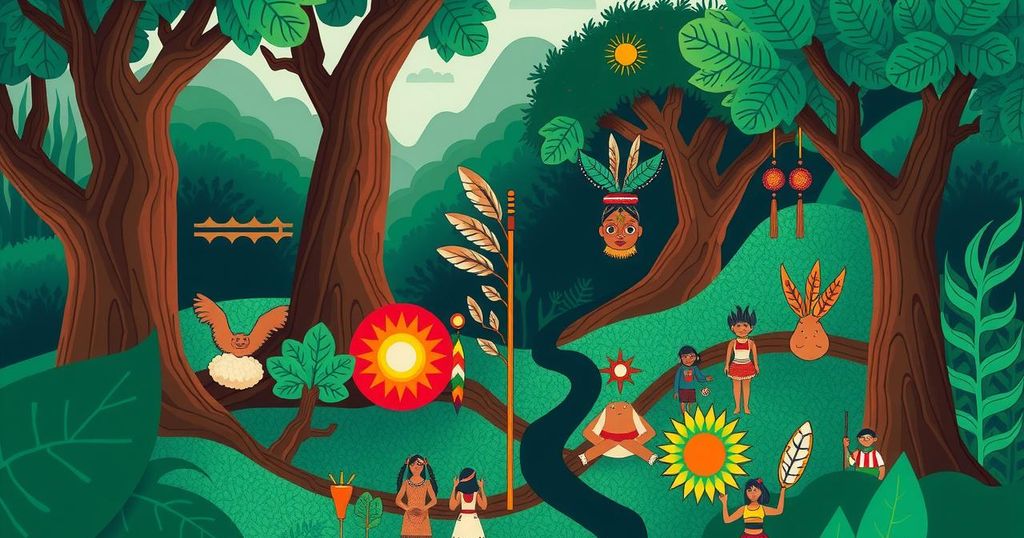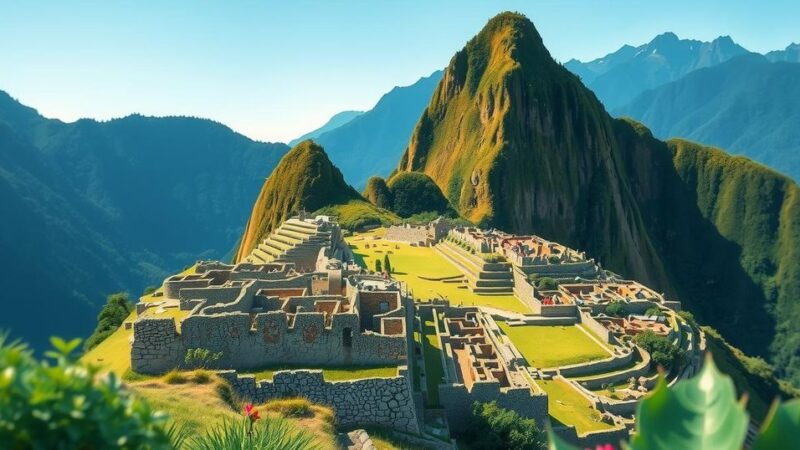The Waorani people in Ecuador are fighting against government-led oil rights auctions on their ancestral land, highlighting issues of Indigenous rights and consultation. In Taiwan, Indigenous communities face misinformation amplified by AI. Peru’s Mari Luz Canaquiri received the Goldman Prize for protecting the Marañón River, while Indigenous Australian students explored aviation careers. A UNESCO report calls for support for Indigenous media to address funding shortages.
In Ecuador’s Amazon rainforest, the Waorani people are firmly opposing a government-backed initiative to auction oil rights on their ancestral lands. This contentious situation could set new precedents for how Indigenous groups are consulted on projects affecting their land. Despite a brief meeting with some Waorani representatives, where crucial details about the impact of oil drilling were omitted, the government moved ahead with the $700 million auction, sparking fierce resistance from these communities.
Back in 2019, the Waorani took significant legal action by suing the federal government for violating their rights to free, prior, and informed consultation (FPIC), which is grounded in both international law and Ecuador’s constitution. The legal debate remains whether actual consent from Indigenous communities is mandatory before any developmental projects can proceed. Pierre Gratton from the Mining Association of Canada pointed out, “If you don’t have community support, you pay a price for it,” stressing the potential conflicts stemming from inadequate engagement.
A significant milestone was achieved when a provincial court ruled in favor of the Waorani, affirming that their FPIC rights had indeed been violated. This ruling is under review by Ecuador’s Constitutional Court, which could further clarify national laws concerning these consultations. However, new oil auctions are threatening to drown the communities in past struggles once again. Waorani leader Luis Enqueri emphasized their stance: “We do not want extractivism. We are fighting for the Constitutional Court to say that we alone have the right to decide what happens in our land.”
In Taiwan, an unsettling wave of digital misinformation has emerged, targeting Indigenous communities. Misinformation, exacerbated by artificial intelligence, distorts and erases Indigenous identities while deepening political divides. Debunked posts about Plains Indigenous soldiers from the 1947 228 Incident, or misidentified footage of protests, illustrate the dangers. Even well-meaning stories can misrepresent cultural realities, which risks eroding Taiwan’s unique Indigenous heritage.
AI has the potential to harm but can also serve as a tool for cultural revival, as demonstrated by New Zealand’s Māori successes with AI-driven speech models. The need for ethical data practices and a focus on Indigenous-led innovations in technology is clear. Only then can AI help revive these cultures rather than erase them.
Meanwhile, an activist from Peru’s Amazon, Mari Luz Canaquiri Murayari, recently won the esteemed Goldman Environmental Prize for her legal battle to secure personhood status for the vital Marañón River. Leading her community’s fight against oil spills that have devastated local ecosystems, Canaquiri celebrated a court’s decision recognizing the river’s rights. Despite the monumental achievement, challenges remain, particularly with the introduction of an “anti-NGO” law, complicating civil society’s ability to act against state actions.
Australia’s Indigenous students exploring aviation careers were notably uplifted when they visited the Royal Flying Doctor Service base in Townsville. They gained invaluable insights into various roles supporting one of Australia’s critical services through the Raising Horizons initiative. As Daniel Joinbee from Gunggandji Aerospace articulated, this program is about connecting First Nations youth with industry and envisioning future aviation leaders. He firmly believes these students represent the future of aviation.
At the United Nations, a new UNESCO report highlights the pressing need for financial support and resources for Indigenous media. Shane Taurima from Whakaata Māori emphasized that Indigenous media face significant challenges, including inadequate funding and access to technology. With 73% of organizations citing funding as a major hurdle, the findings call for a reevaluation of policies to bolster Indigenous representation and rights to communication platforms.
Reflecting on the Waorani’s story, there’s a profound message about the struggle for rights and dignity. Their battle isn’t simply about land but about ensuring their voices are heard and future generations can thrive. The ongoing push for oil extraction goes against Indigenous rights and reiterates the complexities of negotiations that often feel more like coercion. If the world pays attention to the Waorani, it could spell out larger implications for Indigenous rights globally. As they say, it’s about securing life itself, not just ecosystems. The fight for their future could resonate far beyond their borders, calling for a reckoning on how we value nature and respect Indigenous sovereignty.
The Waorani people’s ongoing struggle in Ecuador highlights critical issues of Indigenous rights, environmental justice, and ethical consultation practices. Despite past victories, threats from new oil auctions loom large. Meanwhile, communities across the globe face similar battles with misinformation and discrimination fueled by digital advancements. The success story of Mari Luz Canaquiri Murayari adds depth to the narrative of environmental advocacy, while initiatives like Raising Horizons and UNESCO’s call for support underscore the importance of recognition and resources for Indigenous voices. Ultimately, these narratives are interwoven, reflecting a larger fight for dignity and sovereignty that resonates worldwide.
Original Source: ictnews.org






